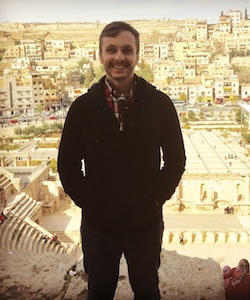In a lot of ways, religious identity rests at the core of one’s identity in Jordanian society. I’ve ridden in more than one cab with a Qur’an or Bible resting on the dashboard, fingers rolling over their prayer beads as they navigate the labyrinth of cars and trucks that considers the rules of the road suggestions rather than laws. More often than not, they’ll ask me whether I’m a Muslim or a Christian. Our program director told us a funny anecdote from a former student who was confronted with this question. After replying that he was an atheist, the cab driver retorted, “Yes, but are you a Christian atheist or a Muslim atheist?”
Indeed, one’s religious identity is a critical part of Jordanian society. Most Jordanians I’ve spoken to talk first and foremost about the ability of Muslims and Christians to get along in Amman and the country in general. Christians and Muslims embrace their similarities and differences in a beautiful way. I had a chance to speak with Father Nabil Haddad, the pastor of Annunciation Church in the Jabal al-Weibdeh neighborhood, last week. Situated in one of Amman’s oldest neighborhoods with a significant Christian population, Weibdeh has transformed into a lively area in recent years.
Fr. Haddad also serves as the executive director of the Jordanian Interfaith Coexistence Research Center, an interfaith organization that creates programming to promote inter religious understanding and provides resources for the Jordanian government to foster peace building across religious lines. By engaging Islam and Muslims in a positive way, the center hopes to strengthen and build bridges among the country’s religious communities.
The reality of the interreligious harmony in Jordan can’t really be summed up in words. It’s simultaneously tangible and intangible, spoken and unspoken. It’s not uncommon to see groups of young female students walking hand in hand with friends, one wearing a hijab (a headscarf covering one’s hair), another wearing a niqab (a veil covering all but one’s eyes), and still another with her hair uncovered.
In a lot of ways, I feel like my first haircut in Amman epitomized the sense of interreligious solidarity in the country. Let me make something clear to everyone: I don’t like getting haircuts. Normally, I’m nervous when that time of the season rolls around. Now imagine someone like me getting a haircut in a foreign country in which I’m going to have to use my foreign language abilities to communicate all the details on how I want my hair styled.
I walked into a barber shop on the way home from class, hoping for the best. Across the street from a small mosque, the barbershop was cozy with comfortable couches and a Turkish soap opera blaring on the TV. The owner greeted me and brought me to his chair. I gave up on my explanation after a minute or so and showed him a picture of what I wanted. He nodded reassuringly. I gulped, fearing I’d told him to shave, not cut my hair. After a few minutes, we started talking while he took a short break for a cigarette. And eventually, the inevitable question popped up:
“Are you Muslim?”
“No,” I replied. “I’m Christian.”
“Oh, because I’m Muslim.” He put down his cigarette and continued trimming the sides of my hair. “You know,” he continued, “Christians and Muslims have a lot in common. I love Jesus. All us Muslims love Jesus.”
I laughed. “I love him, too,” I said and asked, “Muslims consider him a prophet, right?”
He beamed. “Yes. How can a Muslim hate Christians when we love Jesus?”
Jews, Christians, and Muslims: cut from the same cloth, children of the same patriarch, Ibrahim—Arabic for “father of many nations.”
My haircut was one of the best I’ve ever had. I paid and started to leave but suddenly stopped, realizing after half an hour of chatting about family, life, and religion, I never asked for his name.
He looked at me, clearly thinking the same thing, and asked, “What’s your name?”
“Benjamin,” I say—Hebrew for "son of my right hand." “And yours?”
“Sadiq,” he replied—Arabic for “friend.”

